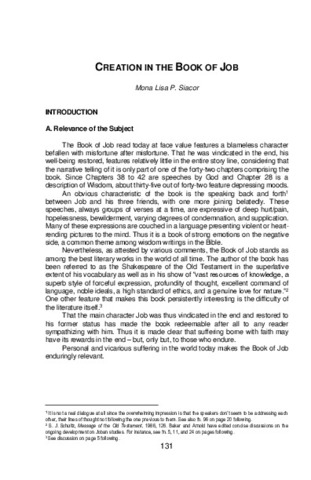Ipakita ang simpleng tala ng item
Creation in the Book of Job
| dc.contributor.author | Siacor, Mona Lisa P. | |
| dc.date.accessioned | 2022-01-24T01:08:39Z | |
| dc.date.available | 2022-01-24T01:08:39Z | |
| dc.date.issued | 2008 | |
| dc.identifier.citation | Siacor, M. L. P. (2008). Creation in the Book of Job. Journal of Theology, 4, 131-163. | en_US |
| dc.identifier.uri | https://hdl.handle.net/20.500.12852/1890 | |
| dc.description | Journal article | en_US |
| dc.description.abstract | The Book of Job read today at face value features a blameless character befallen with misfortune after misfortune. That he was vindicated in the end, his well-being restored, features relatively little in the entire story line, considering that the narrative telling of it is only part of one of the forty-two chapters comprising the book. Since Chapters 38 to 42 are speeches by God and Chapter 28 is a description of Wisdom, about thirty-five out of forty-two feature depressing moods. An obvious characteristic of the book is the speaking back and forth between Job and his three friends, with one more joining belatedly. These speeches, always groups of verses at a time, are expressive of deep hurt/pain, hopelessness, bewilderment, varying degrees of condemnation, and supplication. Many of these expressions are couched in a language presenting violent or heartrending pictures to the mind. Thus, it is a book of strong emotions on the negative side, a common theme among wisdom writings in the Bible. Nevertheless, as attested by various comments, the Book of Job stands as among the best literary works in the world of all time. The author of the book has been referred to as the Shakespeare of the Old Testament in the superlative extent of his vocabulary as well as in his show of “vast resources of knowledge, a superb style of forceful expression, profundity of thought, excellent command of language, noble ideals, a high standard of ethics, and a genuine love for nature.” One other feature that makes this book persistently interesting is the difficulty of the literature itself. That the main character Job was thus vindicated in the end and restored to his former status has made the book redeemable after all to any reader sympathizing with him. Thus, it is made clear that suffering borne with faith may have its rewards in the end – but, only but, to those who endure. Personal and vicarious suffering in the world today makes the Book of Job enduringly relevant. This paper will present a general description of the Book of Job. Then it will deal summarily with creation in wisdom literature. After doing so, it will pick out passages that have to do with creation in Job. It is hoped that, by looking at these specific passages, a meaning will be reached connecting Job’s suffering and Yahweh’s creation. | en_US |
| dc.language.iso | en | en_US |
| dc.publisher | Institute of Advanced Theological Studies (IATS) and College of Theology | en_US |
| dc.subject.lcsh | Creation | en_US |
| dc.subject.lcsh | Creation--Biblical teaching | en_US |
| dc.subject.lcsh | Bible. Job | en_US |
| dc.subject.lcsh | Suffering--Biblical teaching | en_US |
| dc.subject.lcsh | Suffering | en_US |
| dc.title | Creation in the Book of Job | en_US |
| dc.type | Article | en_US |
| dc.citation.firstpage | 131 | en_US |
| dc.citation.lastpage | 163 | en_US |
| dc.citation.journaltitle | Journal of Theology | en_US |
| dc.citation.volume | 4 | en_US |
| dc.citation.issue | 1 | en_US |
Mga file sa item na ito
Lumilitaw ang item na ito sa mga sumusunod na (mga) Koleksyon
-
Journal articles [28]
-
Journal of Theology [24]
A joint publication of the Institute for Advanced Theological Studies (IATS) and College of Theology, Central Philippine University


